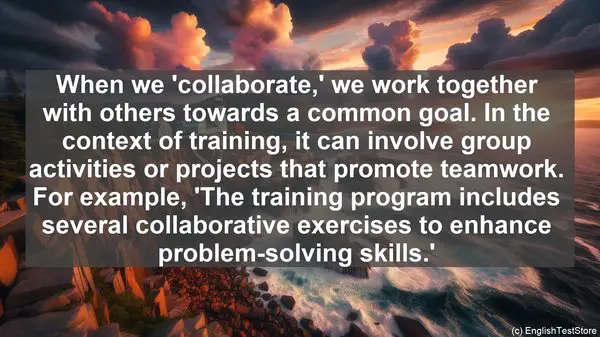1. Implement
The first verb on our list is ‘implement.’ It means to put a plan or strategy into action. In the context of corporate training, it refers to the process of introducing and executing a training program. For example, ‘Our company plans to implement a new training module next month.’

2. Facilitate
‘Facilitate’ means to make a process or task easier. In the realm of employee development, it often involves providing the necessary resources and support for learning. For instance, ‘The HR department facilitates various workshops and seminars for skill enhancement.’
3. Assess
When we ‘assess,’ we evaluate or measure something. In the context of training, it refers to gauging the effectiveness of a program or the progress of an employee. For example, ‘The team lead regularly assesses the trainees’ performance to identify areas of improvement.’
4. Foster
‘Foster’ means to encourage or promote the development of something. In the realm of employee growth, it often pertains to creating an environment that nurtures learning and innovation. For instance, ‘The company aims to foster a culture of continuous learning and development.’
5. Adapt
To ‘adapt’ is to adjust or modify something to suit a new situation. In the context of training, it can refer to tailoring the content or delivery method based on the learners’ needs. For example, ‘The trainer quickly adapted the session when he realized the participants had different skill levels.’
6. Motivate
‘Motivate’ means to inspire or encourage someone to take action. In the realm of employee development, it often involves creating a sense of purpose and enthusiasm. For instance, ‘The manager regularly motivates the team by recognizing their achievements.’

7. Collaborate
When we ‘collaborate,’ we work together with others towards a common goal. In the context of training, it can involve group activities or projects that promote teamwork. For example, ‘The training program includes several collaborative exercises to enhance problem-solving skills.’
8. Communicate
‘Communicate’ is the act of conveying information or ideas. In the realm of employee development, it’s crucial for effective feedback, instructions, and knowledge sharing. For instance, ‘The supervisor regularly communicates the company’s goals and expectations to the team.’
9. Delegate
To ‘delegate’ is to assign a task or responsibility to someone else. In the context of employee development, it can be a way to empower individuals and promote their growth. For example, ‘The manager decided to delegate the project to a junior team member to provide a learning opportunity.’
